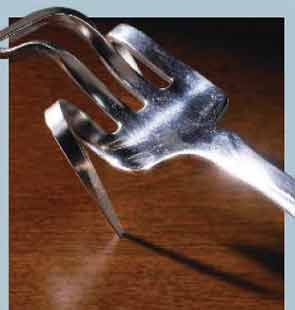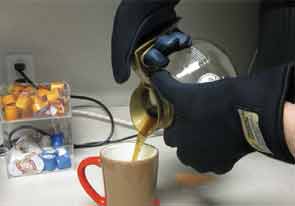
Simple Tasks Online
Visit the members-only Simple Tasks page at www.rheumatology.org for resources to help you share the Simple Tasks message with:
- Members of the media;
- Referring physicians and health professionals; and
- Members of Congress.
You can also visit SimpleTasks.org for:
- The Simple Tasks blog;
- Case studies;
- Videos, and more!
A little bit of PR goes a long way, at least in the case of the ACR Simple Tasks campaign (www.SimpleTasks.org). After only two years, the campaign has gained ground in Washington and among medical organizations. Launched in September 2011, the goal of the campaign was—and still is—to “increase the value of rheumatology,” says Erin E. Latimer, ACR director of public relations. The strategies for achieving this goal are to educate “influencers,” she says, such as legislators and referring physicians and health professionals.
Lawmakers are starting to recognize the bent-fork image, and by association, the field of rheumatology. This recognition positions rheumatology to be considered in the current evolution of healthcare law. Simple Tasks also has had success reaching referring physicians and health professionals, who are embracing the importance of rheumatology as a subspecialty. And, it’s time to expand further—in year three, Simple Tasks will have an established presence in the United Kingdom and will begin a formal research program to discover when and how to best target the public.
We’re providing materials and support and data so [rheumatologists] can talk about the importance of referrals and early treatment, so they can make a difference.
—Eric M. Ruderman, MD
Inroads in Washington
The first step in the campaign was on the streets of Washington, D.C., where Simple Tasks supports the ACR’s ongoing advocacy efforts to ensure lawmakers understand that inflammatory rheumatic diseases are not a normal part of aging, and to garner support for legislation that supports rheumatologists, Latimer says. ACR advocacy volunteers set the stage for lobbying efforts in Washington, D.C., and Simple Tasks regularly supports those efforts.
Examples of actions in Washington, D.C., include sending campaign white papers to lawmakers, doing “Hill drops” by sending messaging and materials to specific lawmakers, holding briefings with other campaign stakeholders like the Society for Women’s Health Research, and securing print and online advertising. A new tactic is to help lawmakers really feel what it is like to have a rheumatic disease. During meetings on Capitol Hill, volunteers ask lawmakers to don special gloves that simulate rheumatic disease and attempt simple tasks like opening a jar of peanut butter or turning a doorknob.
“We take these to lawmakers so they can see what … rheumatology patients go through,” Latimer says. “That approach has started to resonate.”
This resonance has translated into visible results among the campaign’s Capitol Hill audience, who are starting to recognize rheumatology. “In terms of the greatest success so far, and I hear this from lots of people, is that when ACR volunteers reach out to government officials and others in positions of influence, they don’t have to spend the first ten minutes of the conversation talking about what rheumatology is and what rheumatologists do,” says Eric M. Ruderman, MD, chair of the ACR Communications and Marketing Committee (CMC), which manages Simple Tasks. The campaign has paved the way to talk about the issues that are important to rheumatologists and their patients, he adds, “so that we can deliver better care to patients.”
According to Dr. Ruderman, some of the issues that are being addressed in Washington include:
- Ensuring that patients with rheumatic diseases have access to effective treatments;
- Promoting legislation that restricts insurers from charging medication copays that are so expensive patients can’t afford them;
- Backing legislation that supports rheumatologists to ensure they are appropriately reimbursed for services, especially for treating Medicare patients; and
- Supporting the National Institutes of Health and research funding and explaining how that research translates into better clinical care.

Reaching Referring Physicians
Similar to the campaign in Washington, D.C., the messaging to health professionals aims to increase the value and understanding of rheumatology. The goal is to help referring physicians and health professionals identify patients with inflammatory rheumatic diseases and understand when to refer to a rheumatologist. The most important lesson from this outreach, Latimer says, has been that other health professionals want to learn about rheumatology from subject-matter experts.
The standard presence at professional meetings, such as the American College of Physicians (ACP) and the American Academy of Family Physicians, has been hosting an exhibit booth, Latimer says, but that has been expanded to include an “experience station” where attendees can don the simulation gloves. The responses have been “very interesting,” Latimer says, because the physicians are surprised at how difficult it is for their patients with rheumatic disease to complete simple tasks.
In addition to the experience station, Simple Tasks offered a symposium called “Early Recognition and Prompt Management of Rheumatic Disease” at the ACP meeting in April. The symposium included a panel of experts who gave brief presentations, and then spent the majority of their time answering questions from curious participants.
The response was overwhelmingly positive, Latimer says, and these types of sessions will be an ongoing tactic for promoting the campaign at professional meetings. In addition to the meetings at which Simple Tasks has an established presence, the campaign has begun expanding to other groups, such as the American Academy of Physician Assistants and to the Association of American Indian Physicians.

The Road Ahead
Simple Tasks is hopping “across the pond,” as they say, as of October 2013. This expansion is via the British Society of Rheumatology (BSR), which is collaborating with the ACR to launch its version of the campaign during World Arthritis Week. The benefit in the United States won’t be direct, necessarily, Dr. Ruderman says, but “it translates into a benefit to rheumatology in general by increasing global awareness of the importance of what we do.”
Another next step is to more directly involve patients with outreach efforts. That’s where the CMC hopes to see the campaign move next, toward the public, Dr. Ruderman says, explaining that, in addition to targeting patients with rheumatic disease, the campaign could also be targeted more generally to those who may develop rheumatic disease to gain backing for legislation and other policy decisions that support rheumatology.
ACR members are encouraged to volunteer to help spread the Simple Tasks message. Rheumatologists can get involved by giving out the bent-fork lapel pins in their offices, playing educational videos in examination and waiting rooms, using Simple Tasks materials with trainees, speaking locally or at regional chapter meetings, and contacting their lawmakers to ask for legislative support of rheumatology.
As Dr. Ruderman notes, “We’re providing materials and support and data so [rheumatologists] can talk about the importance of referrals and early treatment, so they can make a difference.”
Kimberly J. Retzlaff is a medical journalist based in Denver.
